I live on a beautiful 12-mile island in South Carolina named Hilton Head Island. It’s a small coastal community with roughly 40,000 year-around residents and 3 million annual visitors. Most people who now live on Hilton Head Island first visited, sometimes for decades with their extended families, before moving here so the island is filled with many residents who are transplants.

Geographically Hilton Head Island is in the stereotypically slow, conservative South on the edge of the Georgia state border, however many visitors and transplants bring progressive ideas to the island such as foodservice compostable plastics.
What are they exactly?
Instead of using plastic made from petrochemicals and fossil fuels, compostable plastics are derived from renewable materials like corn, potato, and tapioca starches, cellulose, soy protein, and lactic acid. Compostable plastics are non-toxic and decompose back into carbon dioxide, water, and biomass when properly composted.
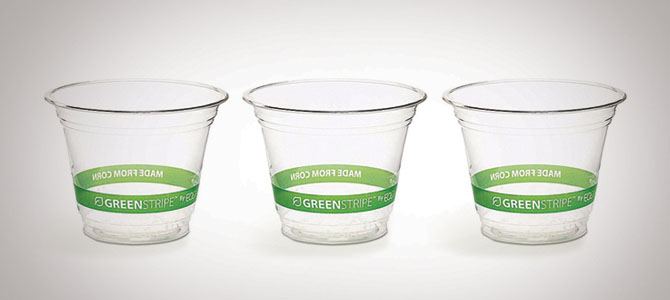
The reason to get away from plastics made from petrochemicals and fossil fuels is that they are rarely recycled, even though they are technically recyclable, and they are polluting the environment by way of the landfill which is designed to store waste, not break it down. One conventional plastic cup may take up to 1,000 years to degrade into micro-plastic particles in a traditional landfill.
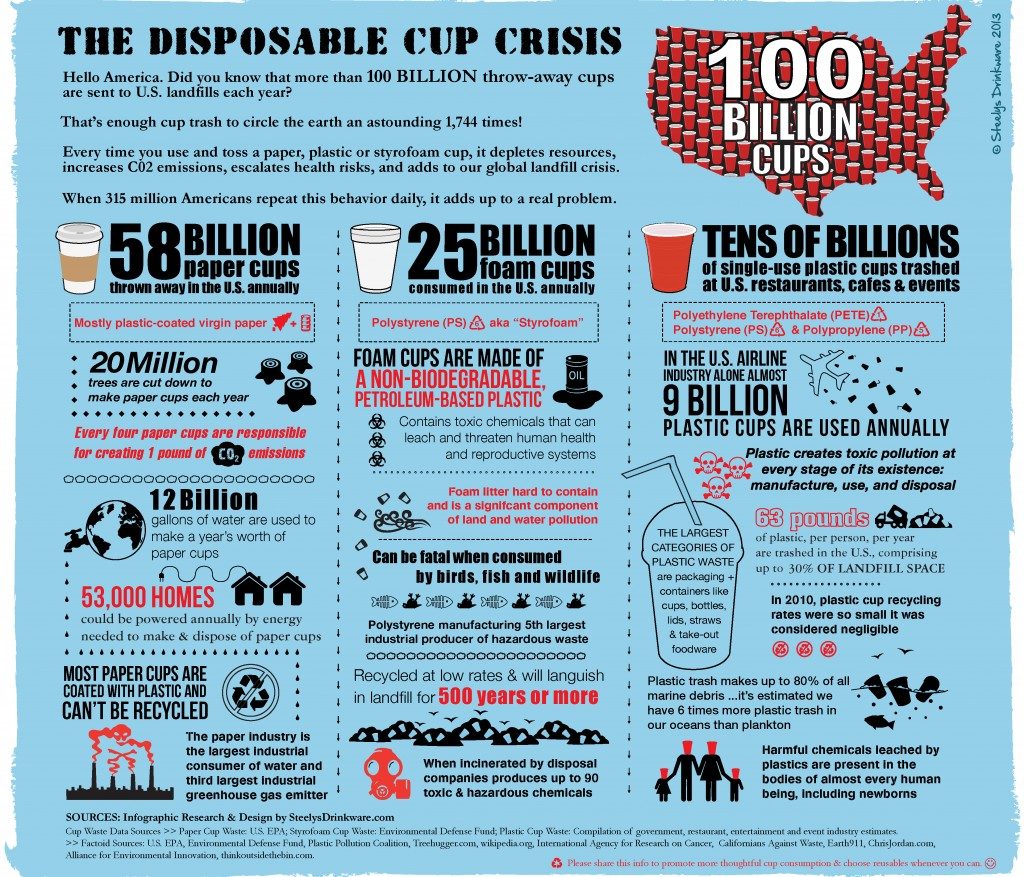
So when several of my favorite local healthy food establishments starting using compostable plastics, I was proud of them and excited for the progressive improvement. While it felt strange to place my plastic smoothie or juice cup in the trash can rather than the recycling bin, I felt assured that the cup would break down and not harm the environment.
Boy was I wrong! SO. VERY. WRONG! That compostable cup will do little more than a petrochemical cup in a location that does not have a dedicated municipal or commercial high-heat composting facility, which the Town of Hilton Head or Beaufort County do not have (hello stereotypically slow, conservative South). All those compostable cups I confidently placed in the trash can are now sitting in the landfill and will for nearly 1,000 more years! Damnit, damnit, damnit!
Hindsight 20/20 Clue #1: compostable plastics are to be placed in a compost collection bin, not a recycling bin nor a trash can. If a food establishment isn’t collecting food scraps for municipal/commercial composting, those compostable plastic cups being offered are basically pointless.
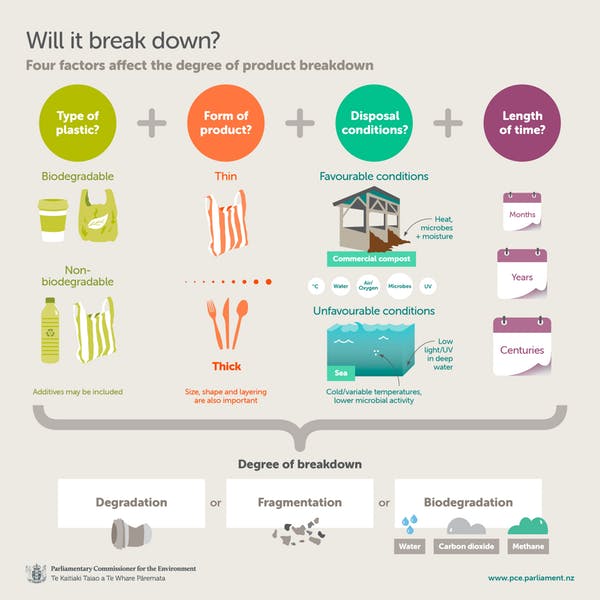
Compostable plastics will not fully break down on their own in traditional landfills. They need to be composted at industrial commercial or municipal composting facilities that specifically compost food waste, yard waste, and/or feedstock (plant) material at high heat for a longer period of time since it may take up to 180 days for compostable plastics to break down. There are more than 50 commercial composting facilities in the United States that openly accept compostable plastics, and more that accept it on a case-by-case basis. The closest municipal composting facility to Hilton Head Island is Charleston County Compost which is 100 miles away. Find your nearest composting facility HERE.
What’s an eco-conscious girl to do? I can’t be driving my compostable cups to Charleston! And my backyard food scrap composting container is too small to sufficiently break down these compostable plastics.
My current dining out decisions include what kind of serving ware will be used and whether they are washable, reusable dishes, paper products, styrofoam, recyclable plastics, or compostable plastics. I have been avoiding places that use styrofoam for years with “recyclable” plastics not far behind. Now I’m avoiding compostable plastics too because they are just as problematic without a nearby commercial composting facility.
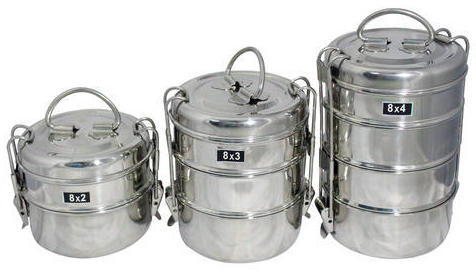
Dining Out Prioritization Based on Serveware:
- establishment-owned reusable & washable plates, cups/mugs, and utensils
- bring my own reusable & washable plate or bowl (like the stainless tiffins above or the bento box below), drinking container, and bamboo utensils that live in my purse
- paper plates, paper cups, wooden disposable utensils
- purchase to-go drinks only in glass (preferable) or non-BPA lined aluminum which are both truly recyclable and are actually recycled
- avoid all single use plastic plates, bowls, cups, lids, utensils, straws, and bags whether they are recyclable or compostable
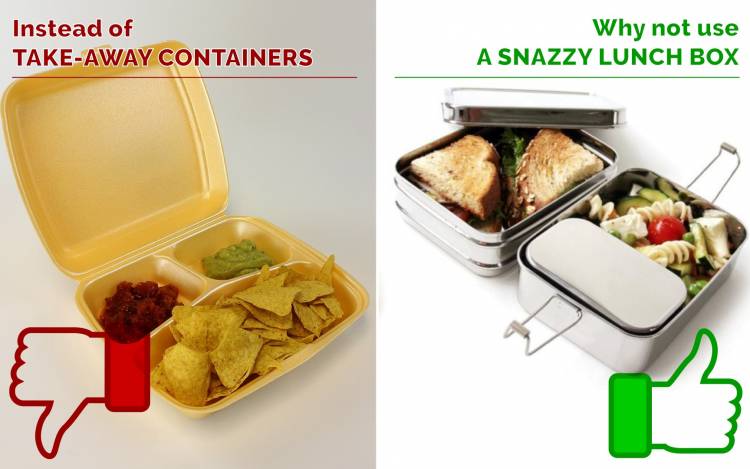
It’ll take a little extra work to research who offers what and make notes for myself about what to bring with me where, but it will be worth it to avoid all single use plastics. So when you see the goofball green girl happily eating her vegan lunch out of a beat up old bowl at your favorite establishment, you’ll know why. Until then I’ll be figuring out what to do with all the compostable trash bags I have on hand. Charleston, any takers?
Maybe you live in a place like Charleston, SC, Oakland, CA, or Asheville, NC, where industrial composting is a thing. Lucky you! Be sure to get those compostable plastics in the right bin! For the rest of us, we need to avoid the trap of wishful thinking offered by compostable plastics.

{ 0 comments… add one now }
{ 1 trackback }